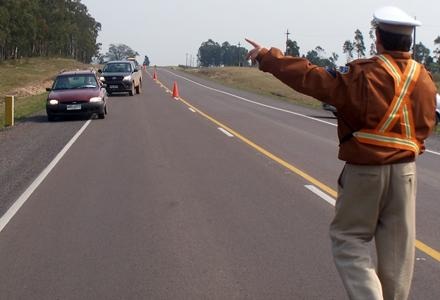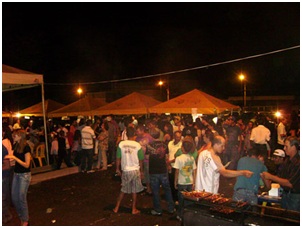Today, different than usual, I started writing this article with its title. Different because the title usually arises somewhere along the writing. What I really want is to blow off some steam, to inform and demonstrate what ethics are; noble values that very few know of. In Brazil we call it being a cara de pau, meaning chutzpah, this cara dura that the title is from.
Years ago, when I was returning from Sao Luis, on an open road that passes through the state of Piaui, we passed a traffic sign indicated a speed limit of 50 mph. My wife at the time, drove steadily at 80 mph right through the radar post and we were stopped by the Highway Patrol. The officer who approached us got straight to the point: “Don’t try to bribe me, because if you try, I’ll have to arrest you.”
Over the following years, I came to tell many people this story which could be considered unprecedented in the annals of this country’s justice system. While, the ease with which the policeman spoke hinted that everyone there operated the same way. I thought about giving a gift to the policeman for his brilliant form of conduct, but recoiled at the thought that it might in fact come off as a bribe. This is one of the few good memories I have from that period when I worked in São Luís do Maranhão.
During a trip to Uruguay, in the last week of January/2013, my son said something that is a lesson I will never forget: “There are good people and their opposites everywhere you go.”
So it was that I became acquainted with, by bitter experience of this absolute truth during a run-in with the “Polícia Caminera”, the so-called—according to Uruguay’s own media—“cara dura” (chutzpah in the US). It is those highway patrolmen, who patrol – rob would be a better word – unwary drivers on the roads of the interior of this small and wonderful country.
I have spoken and written hundreds of times about the great admiration I have for the people of Uruguay.
Upon our return from Colonia del Sacramento late in the afternoon, a few miles down the road, we caught sight of a brand new patrol car from that distinct police force, who signaled my son to pull over, right there in the median between the two lanes. In normal circumstances, I would have let my son step out alone to receive the ticket for driving a little above the speed limit. However, as soon as one of the officers realized that he was dealing with Brazilian “tourists,” he ordered my son to wait for the car behind us to pass by for us to park on the emergency lane, the place he should have indicated to stop according to standard procedure in the first place.
We pulled over, my son stepped out and we saw right away that the guy had already noticed that our car was a rental from Uruguay. The guy started a conversation which we in Brazil call “around Lawrence,” as in to keep a runaround going. The conversation took longer than normal for these situations and I decided to get out of the car and get a closer look. The bandit’s grin grew wider at every passing moment.
I walked over and greeted the impostor while my son was looking for other documents that he, the immoral, claimed he wanted to see. He asked, in his usual raunchy manner, where I worked in Brazil. Then he asked me if a fine of nearly one thousand Reais, or 500 dollars would be a problem for us. “Definitely,” I replied.
At that height of the game, he didn’t get tired of saying how they had just run out of the right form for issuing speeding tickets right there on the spot, and how payment at the Escritório Central da Policia Caminera would get even more complicated for us, since we were obligated to pay the fine until no later than the next day. With my son’s documents in his hands, he still had not written a single word on the ticket he had with him. He insistently reiterated how the fines are very high in Uruguay and that he would have to communicate with the rental company immediately, as it was a Thursday afternoon, and since we were leaving the country on Sunday, they would have to be informed to charge us the exorbitant amount.
After the most indecent grins I have ever seen, we finally got sick and tired of his unnecessary this-this-and-thats and fallacious explanations. He kept saying how his companheiros at the next checkpoints would be keeping an eye on us.
The irritating conversation continued until he finally got straight to the point: If we gave him half of the fine, right there concealed from his colleagues who pretended to look busy by starring at the empty road, he would let us go. At first we were reluctant. But in after hearing a few more of his statements about how his colleagues at the next station would pull us over and how there were at least another dozen reasons to issue us a hefty fine, we were obliged to give in. When we mentioned conceding, my son’s girlfriend, who also has the ethical DNA, tried stepping out but he demanded to my son that she remain in the car, far from the robbery. He even mentioned at an earlier moment that my son was a banker and that he wanted dollars. He made it very clear that there was no way out, an expression he used in his conversation. The best thing for all of us would be to pay the corrupt bribe.
My son went over to his girlfriend who had $ 500 dollars in $ 50.00 bills, took five bills and handed it to the robber. In a tone of porkish irony, he suggested that we will not want our change in pesos, the devalued currency in Uruguay. I noticed that he immediately separated two $50 bills in his pocket, with the obvious intention to “pull a fast one” on his colleagues as well.
After this, when I tried to shake his hand to say goodbye, he revealed himself to be a tremendous joker as he denied extending his hand saying – in three words – that we were decent people, insinuating that it wouldn’t look good for me to shake the hand of a wise guy.
In a country like Uruguay, with people of the highest quality and esteem, a cara dura such as this confirms the rock solid teaching that I got from my son: Everywhere you go there are people of all backgrounds, attitudes, behaviors and forms of conduct. Good people and their opposites.
As further taught by my dear son, the best we can do is to forget a disrespect of this magnitude. We have many more pleasant memories of Uruguay than of getting robbed by a lowly thief, an unbelievable cara dura.
Related Articles













